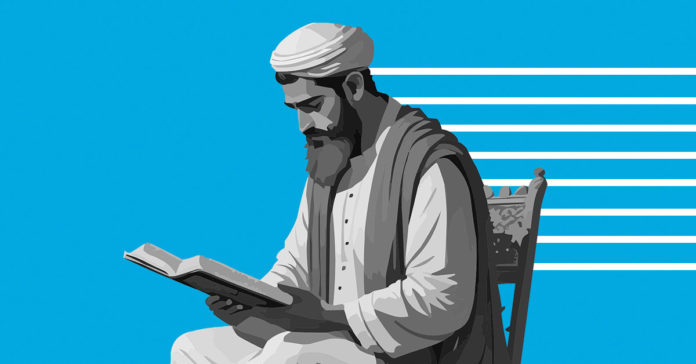No one goes to the depths of pursuing knowledge (talab al-ilm) except the lover of knowledge, and the lover must endure distress. Such preoccupation prevents one from earning his living, and as they have no reliance upon rulers and friends, poverty becomes their companion.
Virtues calls upon them, saying,
“There, the believers were tested and shaken with a severe shaking.” [Qur’an 33:111]
Whenever the self fears a trial, it says:
“Do not think glory is a date-fruit you eat — You will not reach glory until you lick the Aloe Vera extract”
When [Imam] Ahmad Ibn Hanbal chose to pursue knowledge he was in a state of poverty, yet he kept occupied with it for forty years without getting married. The poor must endure such poverty as Ahmad did.
Who is able to endure what he did? He refused to accept fifty thousand, and was accustomed to eating pickles and using salt as filling.
Good reputation did not come to him randomly nor did the feet frequent his grave except for a wondrous reason. What praise it is that filled the horizon, a beauty that adorned the universe and honour that erased every indignity in this worldly life, yet the rewards of the Hereafter are without description.
If you look at the graves of most scholars, no one knows or visits them. They compromised, justified and consorted with the rulers, so the blessing of knowledge was taken away, the honour disappeared and they arrived upon death with regret – what unavoidable regret and what irreparable loss! The company of pleasures was as a blink of an eye and sorrow was permanent.
So have patience O seeker of virtues, because the pleasure of comfort of whims and idleness is erased, with only grief remaining.
Imam Al-Shâfi’i said:
“O soul, it is but days’ worth of patience
whose period is as long as a dream
O soul, give up the worldly life
and leave it, because [real] life is ahead”
As for the poverty-stricken scholar; would he prefer to be granted property from a ruler in exchange for not knowing what you have learned? No! I don’t think the aware would allow you to prefer so.
As a scholar, if you come across a good idea or an amazing meaning behind a matter, you find a pleasure with which no physical pleasures can compete.
Whoever is given to physical pleasures is deprived of what others have of knowledge and acumen. They share the basic components of life, but what remains is only the excess of leaving what usually does not hurt.
They lie mostly at risk at the doors of the Hereafter, and the scholars are mostly safe. Consider therefore, the consequences and repress the urge of laziness that disheartens from virtues. Many scholars who died after being negligent are buried in a state of regret and sorrow.
A man saw our Shaikh, Ibn Al-Zaghwani in a dream, and the Shaikh told him, ‘The most apparent and common thing you have is being unaware (ghafla), and the most common thing we have is regret (nadama).’
Escape (from negligence), may Allah lead you to success, before being held and break the contract of lustful desires and the defrauding of the eyes. Know that virtues are not attained with comforts and negligence in small things deface the virtues.
Seize the opportunity while you are still breathing and the Angel of Death is yet to come, and go with a strong resolve.
“When he decides, his resolve appears between his eyes
and he stops mentioning consequences
He consults, in his affairs, none other than himself
and accepts no companion other than the sword’s handle”
Refuse the worldly life and its followers. May Allah bless the worldly life for its people; we are the rich and they are the poor.
As Ibrahim Ibn Adham said, ‘If the kings and their progeny knew what we have (of knowledge and awareness and contentment), they would have fought against us with swords over it.’
People of this worldly life do not nearly have a mouthful except from an unlawful or a doubtful source. If one of them does not indulge in that himself, his peer or agent does, and he does not care for the lack of their faith.
If they build a house, they exploit workers, if they collect money, it is from invalid sources. Each one of them is afraid of being murdered, removed or slandered – this being their defects.
As for us (scholars), we eat what is apparently permitted by the Shariah, we fear no enemy nor does our jurisdiction move or becomes removable. Honor is for us in this life and not for them. People gathering around us, kissing our hands and glorifying us is abundant. And in the Hereafter, we will differ from them, if Allah Wills.
If the people of the worldly life turn their heads, they will realise the extent of our advantage over them. If their hands are too stingy to give us, the pleasure of abstinence is better, and the bitterness of their favours is not matched by what is taken. It is merely some food below other foods, some clothing below other clothing, and this lasts for merely a few days.
It is astonishing how someone – whose spirit is honoured to pursue knowledge, which is pursued only by honored spirits – can waste it on someone whose honour only comes from money, and whose pride only comes from being in power.
Abu Ya’la Al-Alawi said:
“Perhaps some people have skin disease
that was turned into a blaze
The ugly money hid their flaws
you will see, when it goes, what it was hiding”
May Allah awaken us from slumber, grant us the thinking of the aware, help us operate according to knowledge and wisdom.
For He is Near and Responsive.
[Captured Thoughts by Ibn Al-Jawzi, p. 941-945]









